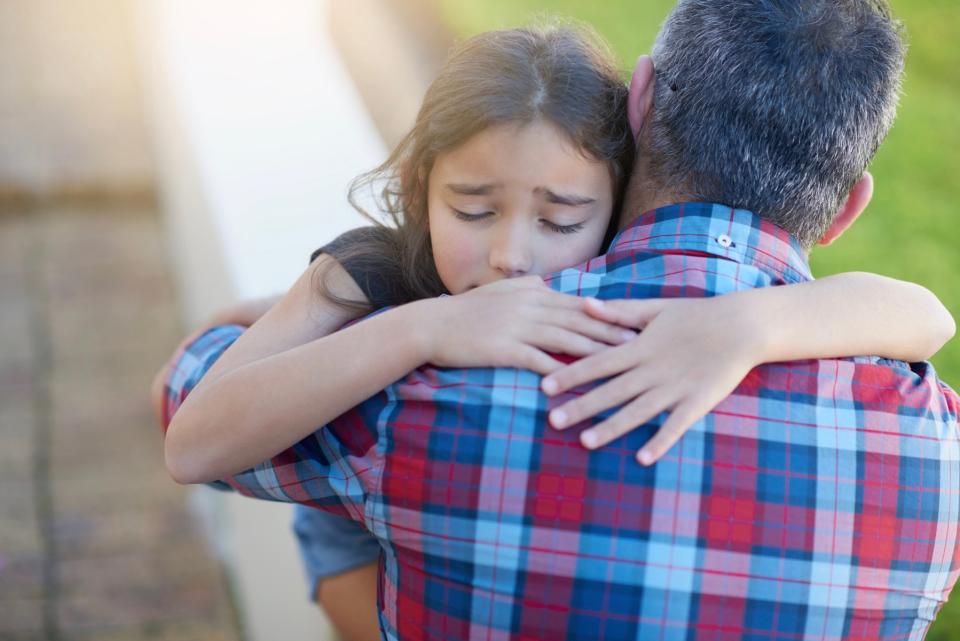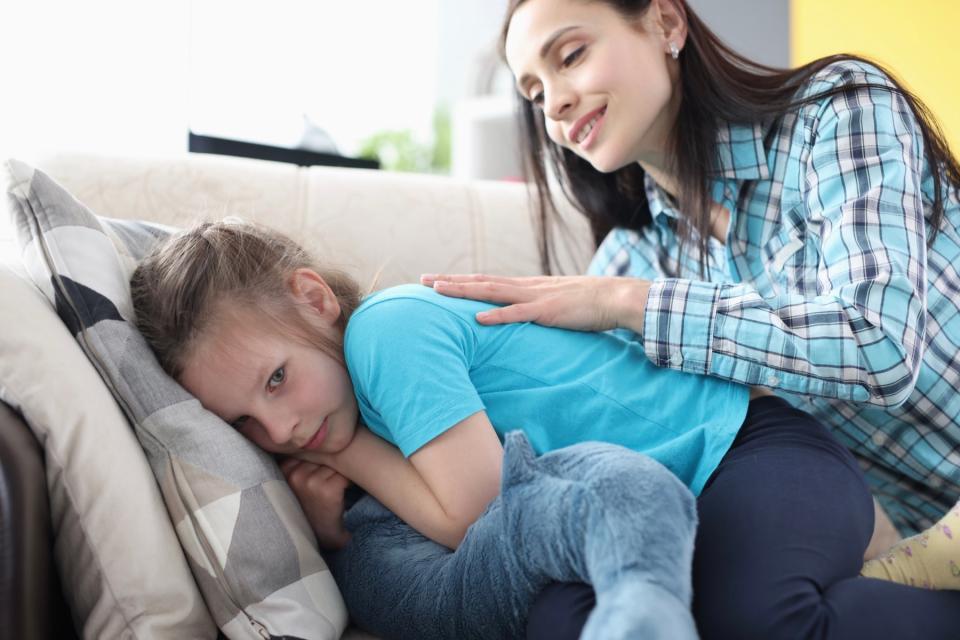Appeasement: A New Theory About Why a Child Clings to One Parent
Parental alienation is a controversial, complicated topic. Parental alienating behaviors can indeed hurt a co-parenting family—but so can a situation that looks like parental alienation.
Appeasement is a new way of understanding why a child clings to one parent over another. Years of working with countless families taught me that not all behaviors or reactions are conscious choices.
Whether it’s appeasement or not, what matters is the child’s experience of the situation.
If your family might be experiencing alienating behaviors, this new perspective could be helpful. Whether you’re the parent feeling alienated, or the one being blamed for alienation, this article is for you.
Appeasement: When a child attaches to one parent to feel safe
Through my work with children experiencing moderate to severe trauma in high-conflict co-parenting situations, I’ve noticed a common set of behaviors that I’ve termed “appeasement.”
In appeasement, a child clings to one parent because the child senses that the parent is struggling. By supporting that parent emotionally, the child feels like they can stabilize the situation allowing them to feel safer.
Based on a theory with a funny name, “the polyvagal theory,” behavior is often driven by unconscious responses based on the perception of safety or danger. Safety or danger can be defined by many factors, not just physical threats. Appeasement is an unconscious response. Our nervous systems, especially the powerful impact of our vagal nerves, are constantly scanning for signs of danger. It’s like a TSA agent waiting to determine if something is safe.
A child may cling to one parent not out of choice, but because their nervous system craves safety. Appeasement is complicated. A child may on some level experience a sense of terror (i.e., the child feels like the world and their parent have become unstable.) This is unsettling to a child who needs a sense of safety and security. A dysregulated parent can serve to dysregulate and worry the child.
A child may then move unconsciously through the fight/flight response toward connection with the dysregulated parent in hopes of regulating themselves and the anxious parent. All of this is in the service of helping the child feel protected in the face of emotional, physical, or spiritual chaos.
Saying it another way: When parents are engaged in a high-conflict divorce, children feel unsafe. The world is churning with conflict. Children sense the disruption and strive without conscious thought to calm the storm down.
They may worry about the parent who appears most distressed. Unconsciously that child may make it their business to help that parent stabilize. It is not necessarily an example of a “poisoned” child. A worried child may be attempting to help themselves feel safer and calmer.
I’ve found that helping kids and families get out of the corner, in these situations, is a lot more effective than blaming either parent or blaming the child. Getting out of the corner means helping them see that they are acting to calm themselves and their parent down. It certainly should not be their job, but understanding it as an unconscious response is a step to getting them out of the proverbial corner.

How does the nervous system work, and what does that have to do with appeasement?
The Cleveland Clinic explains:
“Your nervous system is your body’s command center. It’s made up of your brain, spinal cord and nerves. Your nervous system works by sending messages, or electrical signals, between your brain and all the other parts of your body. ... Your nervous system keeps track of what’s going on inside and outside your body and decides how to respond to any situation you’re in.”
Polyvagal theory builds on these scientific facts. According to the Polyvagal Institute, “Polyvagal Theory helps us understand how our body and brain work together to respond to stressors that are a part of everyday life as well as experiences that are more significant, such as trauma.”
When you’re emotionally regulated, you feel calm and safe. You are in control of your emotions because you are healthily coping with stress. When you are overwhelmed by a stressful experience and struggling to cope, on the other hand, you might act out emotionally in extreme or inappropriate ways. That’s dysregulation.
When a parent is dysregulated, their child may feel dysregulated as well. Children rely on their parents for safety cues, and when a parent is highly dysregulated, the child feels unsafe and feels like they need to calm that parent down to recreate a sense of security.
Sometimes, one parent is blamed for squeezing the child to align with them. But I'm saying that a child's nervous system may adapt to align with one parent—whether they’re squeezed or not—to help them feel integrated and regulated, by helping their parent feel regulated.
Appeasement is really an unconscious response to a feeling of threat. And divorce feels like a threat. In situations of domestic violence, this is much more complex and indeed may be life-threatening. But even in high-conflict cases without domestic violence, the child’s nervous system still senses a threat to their emotional safety.
What situations can lead to appeasement?
One parent may be highly dysregulated, and the child may sense this. The child subconsciously feels responsible for regulating that parent, regulating themselves (instead of co-regulating with a parent), and even regulating the whole household (to protect a sibling or simply to feel comfortable at home).
There are seven situations where appeasement is more common:
- The parents fight all the time.
- There is or was domestic violence in the home.
- One parent is mentally ill (and it’s poorly managed).
- One parent is an alcoholic or uses other drugs.
- Life will change dramatically post-divorce: House, neighborhood, etc.
- One parent is stricken with grief in response to the divorce.
- One parent deliberately tries to alienate the child from the other parent.
Notice that only one of these situations involves deliberately alienating behavior.
Often, the child feels safer being with the less regulated parent because their sense of safety is connected to keeping that parent happy and supported. It may be counterintuitive to think a child would want to be with a highly anxious parent, but experience has shown me that some children do worry about another parent and will take steps to care for them. In some cases, this pull can be misperceived as alienation.
Appeasement is not healthy if it permeates a relationship, but it may be an instinct for some. We all know people who avoid conflict, taking on the role of the soother. Sometimes, this can also turn into parentification—a situation where the parent treats the child like a parent or an equal adult.
What does appeasement look like? How can you recognize it in your kid?
Here are a few ways to notice when your child is unconsciously accessing the appeasement response. Notice my wording there—the child is not choosing appeasement, or even wanting to appease. It’s a gut instinct that they don’t even think about.
You might see a parentification scenario, as mentioned above.
You might see a child talking about an event that would be frightening to anybody, but they're saying, “No, I understand, it’s fine,” in a way that seems too wise for their years.
And you might see a close alignment with one parent, a puzzling splitting of affection. From the outside, people might ask, “What the heck is that? It's alienation! This parent must be pushing it!” But sometimes, it’s something very different.
What’s missing here is causality: What’s causing this behavior?
The child may not be deliberately alienated from their other parent. We know that those extreme situations do happen, but the appeasement response is likely more common than we thought. It’s simply the child’s way of keeping their nervous system regulated in their body.
Kids base their sense of safety on their parents, and if a parent doesn’t feel safe, then neither does the child. Calming that parent down through a close attachment is one way to feel safe again.
A parent can be dysregulated without being malicious.

What’s the difference between appeasement and parental alienation?
With parental alienating behaviors, one parent purposefully tries to get a child on their side by turning them against the other parent. The alienating parent shares information and emotions intended to make the child dislike the other parent.
In appeasement, however, the child turns away from one parent and towards the other as an instinct—not because they are “poisoned” against the first parent, but rather because they are subconsciously worried about the second parent or even their own safety and security.
Both look like a child expressing a huge preference for one parent over the other, sometimes to the complete exclusion of the alienated parent. But getting to that place takes a very different path.
The great news is that getting out of appeasement is like getting out of parental alienation. For both situations, look at it from the child’s point of view. What kind of support do they need to surface from this overwhelming, disconcerting, disconnected experience?
Important note: You can’t reason a child out of appeasement
If you try to explain to a child, “That’s not your role to play in the family,” you're not going to get anywhere. If they feel dysregulated when they're not with the parent they’re attached to, then they won’t be able to see your reasonable arguments trying to lure them away from that attachment. When people are dysregulated accessing upper-level cognitive thinking is almost impossible. First, they need to calm down and feel secure enough to reason.
It is unfair to the child to label their behavior and call it irrational. It is also unkind, even cruel because their behavior makes all the sense in the world to a scared nervous system.
The kid often knows that one parent is being blamed as the source of all these problems, and the child may then feel like it's their role to support that parent. They might feel like they need to do that for the sake of the whole family system. And if we get into a blame game, it doesn't help. It can make the situation worse—and the child gets further entrenched in appeasement.
If your child is experiencing appeasement, what can you do?
Although it’s a complicated situation, there are specific things you can do to figure out what’s happening and then help your child work through it.
Focus on the perspective of the child
First, and most importantly, get out of your assumptions about the other parent. It’s tempting to guess and interpret what the other parent is thinking, saying, and doing. But repeatedly, I’ve found that it’s more helpful to look at it through the lens of regulation or dysregulation. It gives everybody a way out of the unhealthy situation. It allows people to have some dignity in coming back into the conversation.
When we start pointing fingers and accusing and pushing, all it does is get the child further into appeasement. They’ll do whatever they need to do to feel calm. Remember, it is not a conscious process.
If you look at it through the eyes of your child, then it’s easier to leave behind your guesses about your co-parent and to work on fixing the problem effectively.
Notice your child’s behavior
It’s hard to regulate your own emotions when your heart is broken or you're fighting a lot—but the more regulated parent is the one who can notice the child’s appeasement behavior. You're not your child's therapist, but you can observe your child and notice if they subconsciously try to calm the situation or calm a certain parent when emotions run high.
Regulate your own emotions to signal that everything is going to be ok
Use your own social and emotional skills to send a message of safety and security. I like to say, “Befriend your own nervous system.” In other words, intentionally work to develop coping skills and distress tolerance. By showing calmness and modeling coping skills around your child, it’s like a lighthouse sending out a beacon, “We're okay here!”
It’s hard to do when you're going through it—really hard—particularly if the other parent is highly dysregulated and in fight/flight, agitating the situation. But you must hold on to your own skill set.
As a side note, be careful to not play armchair therapist and talk to your friends about how your co-parent is a narcissist or borderline or whatever. Because the more you do that, the more it dysregulates you. And then the more your child will have to increase their appeasement behavior.

Use OurFamilyWizard’s ToneMeter™ to check your own regulation
No kidding, OurFamilyWizard’s ToneMeter tool is such a smart concept. It highlights language that could escalate conflict. It’s like asking, “Instead of making things worse, how do we take the oomph out of this?”
So reflect on the sentences that ToneMeter highlights. Don't just click “send”—instead, look at it and ask yourself, “How does this message affect my nervous system when it’s said this way, as opposed to that way?”
Pay attention to the communication patterns you keep falling into—not the other parent’s patterns. It’s high-level Zen training to learn to pay attention to your own nervous system responses.
Consider your child’s personality, temperament, and values
Appeasement isn’t a learned behavior; it’s more about the children’s innate temperaments and physiological responses. One child may lean towards appeasement, whereas another child only knows how to provoke an argument, and yet another child just takes off on their bicycle and is never there. Those represent the different states of the nervous system.
The fight/flight response is another state, an “I'm out of here” reaction, sometimes appearing as a kid on a bicycle running away or even the schoolyard bully. The dorsal state is the shutdown, anywhere from retreating into their room to closing off like a turtle. A wise friend reminds us, “You can't shake a turtle from its shell.” A child utilizing appeasement as a survival state might look calm and highly regulated as they have managed to land in a state of social connection despite the chaos around them. Unconsciously they make it their job to try to calm the situation down and in the service of regulation.
In the alcoholic family system theory, the “responsible child” or even “hero child” protects the addicted parent from any confrontation or consequences due to their addiction. In the case of appeasement, the child protects the dysregulated parent from any confrontation or consequences due to their dysregulation. (Or due to the deeper problem causing that dysregulation, like addiction or untreated mental illness.) The child feels a subconscious responsibility to keep the family running (often leading to parentification).
When you’re responding to appeasement, it’s important to support the child for who they are. If a child is naturally responsible, you can support that part of them while helping them get out of the appeasement situation. They can be a responsible person without being responsible for their parent’s emotions.
Try traditional talk therapy for you—but keep this in mind
I’m a big believer in therapy. A good therapist can help you improve your emotional regulation and gain coping skills, which is crucial to helping your child in this situation. In any situation, really.
But I also believe it’s important to find a therapist who doesn't feed your fire by diagnosing the other parent and focusing on the other parent’s actions. Therapy is a place where you can be completely honest and own your part of the problem—really own it. To do that, you have to admit and acknowledge your piece of the puzzle.
And that's hard when you're grieving a relationship because you're in that dorsal shutdown, and it's already embarrassing enough. But a good therapist will say, “Okay, so the other parent is doing that. What about you?”
The goal of therapy isn’t to feel justified in your anger. It’s to understand your role in the chaos and figure out the best steps to give you and your child a safe and healthy family environment.
Try experiential therapy for your whole family
Even in a traditional talk therapy session, appeasement can be an instinct for the child. And that's why I'm such a big believer in experiential therapy, “a form of therapy that involves immersing yourself in a certain experience.”
A couple of weeks ago, I worked with a co-parenting family, along with Dené Carroll, a licensed clinical social worker, and a wonderful friend and colleague. We simply had the family members cook together. We got them to a place where the kids stopped trying to unconsciously appease one of the parents, and just kicked into this connection with the other parent. Just through cooking and an apology!
If your child is demonstrating appeasement, focus on getting them out of the corner
Appeasement is not a learned skill set. It’s an involuntary response. It’s nature, not nurture, and it doesn’t require any deliberate poisoning of the mind.
There are situations of parental alienation. There's a whole cornucopia of issues there. But many situations are far more nuanced than a one-size-fits-all self-diagnosis.
Helping your child reach a place of healthy self-regulation is the most important thing in this situation. We know dysregulation of the nervous system can damage a child’s mental and even physical health.
Psychology Today explains that it is common for children experiencing chronic trauma to have a severely dysregulated nervous system. (And, just to be clear, a high-conflict divorce absolutely, scientifically counts as childhood trauma.) These children “may experience autonomic dysfunction, sleep disturbances, and emotional dysregulation. Equally common are unexplained memory problems, dizziness or chronic headaches, gastrointestinal problems, and muscle pain.”
Domestic violence exists, and parental alienation exists, and I’m not saying they don’t. But the important question is, how do we unravel the child’s role in this situation in a healthy way?
It all comes back to focusing on your child’s perspective. Move blame and conflict out of the way. Regulate yourself, model regulation, and help your child learn to regulate themselves. Pay attention to their behavior, respect their personality, and get professional help. I especially recommend experiential therapy.
Your child doesn’t have to remain stuck in appeasement. Your child deserves to feel regulated, integrated, and safe with both parents.




